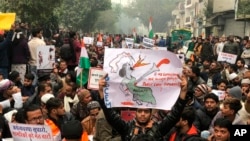ການປະທ້ວງຕໍ່ຕ້ານກົດໝາຍໃໝ່ ທີ່ສະເໜີໃຫ້ສັນຊາດແກ່ພວກທີ່ບໍ່ແມ່ນມຸສລິມຈາກບັນດາປະເທດເພື່ອນບ້ານຂອງອິນເດຍ ໄດ້ແຜ່ຂະຫຍາຍອອກໄປທົ່ວປະເທດໃນວັນພຸດວານນີ້ ທັງໆທີ່ລັດຖະບານໄດ້ດຳເນີນການ ເພື່ອຄວບຄຸມການປະທ້ວງດັ່ງກ່າວ.
ຫລັງຈາກສານສູງສຸດ ໄດ້ເລື່ອນເວລາໃນການຮັບຟັງການທ້າທາຍຕໍ່ກົດໝາຍນີ້ແລ້ວ ການປະທ້ວງກໍໄດ້ລະເບີດຂຶ້ນຢູ່ທີ່ເມືອງກາຮູອາຕີ ເຊັນໄນ ລັດທະມິລນາດູໃນພາກໃຕ້ຂອງປະເທດ ແລະທີ່ ສູນກາງການເງິນ ນະຄອນມູມບາຍ. ການປະທ້ວງຍັງໄດ້ແຜ່ລາມໄປໃສ່ເມືອງສຣີນາກາ ສູນກາງທ່ອງທ່ຽວໄຈປູຣະ ລັດທະເລຊາຍຣາຊທັນ ແລະໂກຈີ.
ພວກປະທ້ວງຫຼາຍຮ້ອຍຄົນໄດ້ພາກັນຮ້ອງຄຳຂວັນແລະສະແດງຮູບພາບຂອງຕຳຫຼວດບຸກເຂົ້າໄປໃນໝູ່ພວກນັກສຶກສາທີ່ບໍ່ມີອາວຸດ ນອກມະຫາວິທະຍາໄລຈາມີອາ ມີລີອາ ອິສລາມີອາທີ່ນະຄອນຫຼວງນິວເດລີ ຊຶ່ງເປັນບ່ອນທີ່ເກີດການປະທະທີ່ສຳຄັນໃນວັນອາທິດແລ້ວ.
ເຈົ້າໜ້າທີ່ໄດ້ຊອກຫາທາງຄວບຄຸມການປະທ້ວງ ໂດຍຂະຫຍາຍການບໍ່ໃຫ້ໃຊ້ອິນເຕີແນັດແລະຫ້າມອອກນອກເຮືອນທີ່ລັດອັສສຳ. ນອກນັ້ນແລ້ວ ເຈົ້າໜ້າທີ່ຍັງໄດ້ຫ້າມບໍ່ໃຫ້ມີການໂຮມຊຸມນຸມ ຢູ່ຕາມຄຸ້ມຊາວມຸສລິມໃນນະຄອນຫຼວງນິວເດລີ ບ່ອນທີ່ພວກປະທ້ວງໄດ້ເຜົາປ້ອມຍາມຕຳຫຼວດ ແລະລົດຫຼາຍຄັນໃນວັນອັງຄານແລ້ວ.
ກົດໝາຍໃໝ່ນີ້ ຈະເລັ່ງລັດເສັ້ນທາງໃນການຂໍສັນຊາດ ສຳລັບຫົກສາສະໜາທີ່ບໍ່ແມ່ນອິສລາມ ເຊັ່ນວ່າ ຮິນດູ ຊິກ ແລະຄຣິສຕຽນ ທີ່ຫລົບໜີການປະຫັດປະຫານຢູ່ໃນສາມປະເທດ ປະກອບດ້ວຍປາກິສຖານ ອັຟການິສຖານແລະບັງກລາແດັສ.
ແຕ່ແນວໃດກໍຕາມ ກົດໝາຍດັ່ງກ່າວນີ້ບໍ່ໄດ້ໃຫ້ສິດແກ່ພວກຊາວມຸສລິມ ຊຶ່ງໄດ້ກໍ່ໃຫ້ເກີດຄື້ຶ້ນການປະທ້ວງ ທີ່ແຜ່ລາມອອກໄປທົ່ວປະເທດອິນເດຍ.
ກົດໝາຍທີ່ໄດ້ຮັບການແກ້ໄຂກ່ຽວກັບການຂໍສັນຊາດ ໄດ້ຮັບການອະນຸມັດດ້ວຍຄະແນນສຽງເປັນຈຳນວນຫຼວງຫຼາຍໃນອາທິດແລ້ວນີ້ ຢູ່ໃນທັງສອງສະພາຂອງອິນເດຍ.
ພວກຕ້ອງຕິຍັງຢືນຢັດວ່າ ກົດໝາຍດັ່ງກ່າວແມ່ນຕົວຢ່າງທີ່ເປີດເຜີຍໃນການຈຳແນກກີດກັນຂອງນາຍົກລັດຖະມົນຕີນາເຣັນດຣາ ໂມດີ ຕໍ່ພວກຊາວມຸສລິມຂອງອິນເດຍ ນັບຕັ້ງແຕ່ທ່ານໄດ້ຮັບໄຊຊະນະແບບເດັດຂາດ ໃນການເລືອກຕັ້ງເມື່ອເດືອນພຶດສະພາຜ່ານມາແລະລະເມີດຕໍ່ລັດຖະທຳມະນູນທີ່ບໍ່ຝັກໄຝ່ໃນສາສະໜາຂອງອິນເດຍ.
ນາຍົກລັດຖະມົນຕີໂມດີ ໄດ້ກ່າວເຖິງກົດໝາຍໃໝ່ນີ້ວ່າ ສະແດງອອກຊຶ່ງຄວາມເປັນມະນຸດສະທຳ.
Protests against a new law that offers citizenship to non-Muslims from neighboring countries continued to spread throughout the country Wednesday, despite a government campaign to suppress them.
After the Supreme Court postponed a hearing challenging the law, demonstrations erupted in Gahuati, Chennai, the southern state of Tamil Nadu and in the financial capital of Mumbai. Protests also spread to Srinagar, the tourist region of Jaipur, the desert state of Rajasthan and to Kochi.
Hundreds of protesters chanted slogans and displayed images of police charging unarmed students outside Jamia Millia Islamia University in New Delhi, the scene of a pivotal clash on Sunday.
Authorities sought to contain the protests by expanding a block on the internet and a curfew in Assam. They also restricted gatherings in a Muslim community in New Delhi where demonstrations torched a police booth and several vehicles on Tuesday.
The new law will fast track citizenship for six non-Muslim religious minorities such as Hindus, Sikhs and Christians fleeing persecution from three countries: Pakistan, Afghanistan and Bangladesh
The law, however, does not apply to Muslims, triggering waves of unrest that have spread throughout India.
The Citizenship Amendment Act was approved by wide margins last week in both houses of parliament.
Critics maintain the law is Prime Minister Narendra Modi's most overt example of discrimination against India's Muslims since his convincing reelection victory in May and a violation of the country's secular constitution.
Prime Minister Modi has described the new law as a humanitarian gesture.
Eighty-percent of India's population are Hindu and 14 percent are Muslim, making India home to one of the world's largest Muslim populations with 200 million people.
The law's passage followed a controversial process in Assam that led to the identification of nearly 2 million people as illegal immigrants who now risk being stateless. Some fear the process, known as the National Register of Citizens (NRC), will be used by Hindu nationalists to deport or detain Muslims.
In August, Modi's Hindu nationalist government revoked the special status of the Muslim-majority Kashmir region.
The law's approval also came after a court ruling that allowed the construction of a Hindu temple on the site of a mosque that was torn down by Hindu zealots.
Protesters' anger toward the government further intensified on Sunday following allegations of police brutality during a student-led demonstration at Jamia Millia Islamia University in New Delhi. Police entered the campus and fired tear gas at protesters, injuring at least 100 people.
Police spokesman Sunil Bainsla said the allegations of police brutality were "lies."





